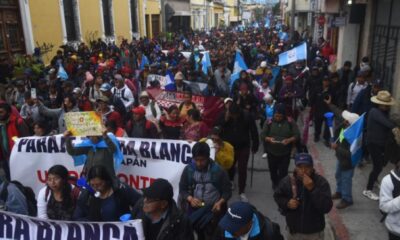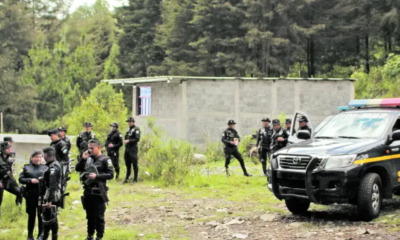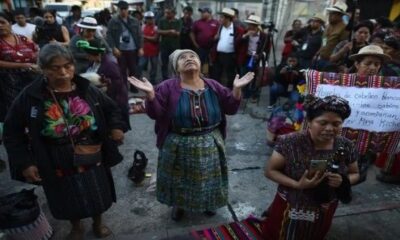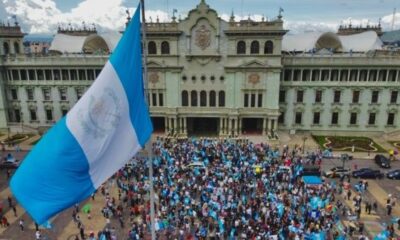International
Spain is optimistic about the future of Guatemala with the Government of Arévalo de León
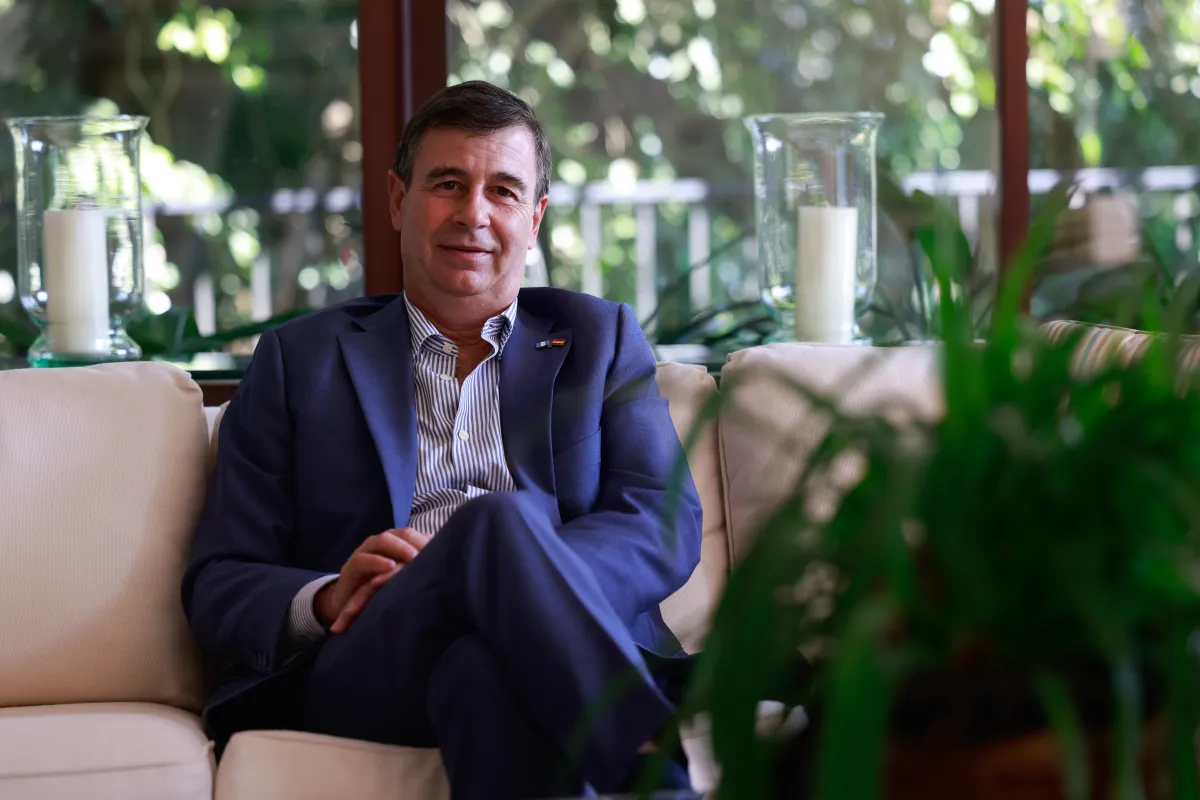
Spain sees with optimism the future of Guatemala after the arrival of Bernardo Arévalo de León, inaugurated on January 15, due to his government plan and his social projects.
This was stated by the now former ambassador of Spain to Guatemala, José María Laviña, who was at the head of the diplomatic delegation from September 2020 until the end of his mandate this week.
“It has been three and a half intense years,” Laviña recalled in an interview with EFE, referring to his arrival in Guatemala in the midst of the COVID-19 pandemic.
Undoubtedly, the passage of Laviña in Guatemala was also marked by the support of Spain and the European Union for the Guatemalan electoral process, at risk for much of 2023 due to the attempts of the Public Ministry (Fiscalía) to reverse the triumph at the polls of Arévalo de León.
According to the Spanish official, the Guatemala he met in 2020, when landing in the country, is not the same as the current one: “Politically, there are indeed differences to the last stage of the Government of (Alejandro) Giammattei, with the attempts made from different institutions and powers to prevent the investiture of Bernardo Arévalo.”
However, in his vision, the new president was able to take office thanks to the effort of the Guatemalans to maintain democracy, and “in the second term,” due to international support.
“I was surprised by the virulence of those attacks, of those judicialization, of politics, that there was the final stage of last year against the president and the political party Semilla,” he added.
Laviña asserted that he had never lived an investiture like the one scheduled for last January 14, where, according to experts, the inauguration of Arévalo de León was at risk and that is why it was delayed until January 15.
“Everyone who has attended the inauguration in Latin America has seen very unique things, but I think that what happened here with those 12 hours of delay, about the scheduled schedules, I think no one expected it,” he said.
In the same sense, Laviña considers that it was “a little sad” what happened by the “image” that Guatemala was providing “live” to the world.
Regarding the new Government, the now former ambassador says that there are “many opportunities” for the country because Arévalo “has a very evident social content in his political program” in search of the “welfare state” for the most disadvantaged.
“The triumph of democracy in Guatemala can and should be an example for many countries that have experienced complicated situations,” he said, with “optimism” about the future of the Central American nation.
The 60-year-old diplomat, born in Oviedo (in northwestern Spain) assured that it has been a “privilege” to occupy the position in Guatemala, a country that has left his mark and where he has been practically “five percent of my life.”
From September 2020 to date, he visited 20 of the 22 departments (provinces) of the country and the “most remote” places in the territory, hand in hand with Spanish cooperation.
“I think Guatemalan gastronomy has a lot of future, based on traditional dishes, and its places are wonderful,” Laviña stressed, always trying to get out of the “bubble” that is Guatemala City, which “does not represent the country.”
Regarding Spain’s relationship with Guatemala, Laviña described it as “very good” both in the past and at present.
In place of Laviña, the Spanish Government appointed the diplomat Clara Girbau, who served as permanent representative of Spain to the European Union as coordinator in charge of the working groups on relations with Africa, the Caribbean and the Pacific.
International
Thousands rally nationwide against Trump’s threat to U.S. democracy

Thousands of protesters gathered on Saturday (April 19, 2025) in major cities like New York and Washington, as well as in small communities across the United States, in a second wave of demonstrations against President Donald Trump. The crowds denounced what they view as growing threats to the country’s democratic ideals.
In New York City, demonstrators of all ages rallied in front of the Public Library near Trump Tower, holding signs accusing the president of undermining democratic institutions and judicial independence.
Many protesters also criticized Trump’s hardline immigration policies, including mass deportations and raids targeting undocumented migrants.
“Democracy is in grave danger,” said Kathy Valyi, 73, the daughter of Holocaust survivors. She told AFP that the stories her parents shared about Adolf Hitler’s rise to power in 1930s Germany “are happening here now.”
In Washington, demonstrators voiced concern over what they see as Trump’s disregard for long-standing constitutional norms, such as the right to due process.
International
ACLU seeks emergency court order to stop venezuelan deportations under Wartime Law

The American Civil Liberties Union (ACLU) on Friday asked two federal judges to block the U.S. government under President Donald Trump from deporting any Venezuelan nationals detained in North Texas under a rarely used 18th-century wartime law, arguing that immigration officials appear to be moving forward with deportations despite Supreme Court-imposed limitations.
The ACLU has already filed lawsuits to stop the deportation of two Venezuelan men held at the Bluebonnet Detention Center, challenging the application of the Alien Enemies Act of 1798. The organization is now seeking a broader court order that would prevent the deportation of any immigrant in the region under that law.
In an emergency filing early Friday, the ACLU warned that immigration authorities were accusing other Venezuelan detainees of being members of the Tren de Aragua, a transnational criminal gang. These accusations, the ACLU argues, are being used to justify deportations under the wartime statute.
The Alien Enemies Act has only been invoked three times in U.S. history — most notably during World War II to detain Japanese-American civilians in internment camps. The Trump administration has claimed the law allows them to swiftly remove individuals identified as gang members, regardless of their immigration status.
The ACLU, together with Democracy Forward, filed legal actions aiming to suspend all deportations carried out under the law. Although the U.S. Supreme Court recently allowed deportations to resume, it unanimously ruled that they could only proceed if detainees are given a chance to present their cases in court and are granted “a reasonable amount of time” to challenge their pending removal.
International
Dominican ‘False Hero’ Arrested for Faking Role in Nightclub Collapse That Killed 231

A man identified as Rafael Rosario Mota falsely claimed to have rescued 12 people from the collapse of the Jet Set nightclub in Santo Domingo—a tragedy that left 231 people dead—but he was never at the scene.
Intelligence agents in the Dominican Republic arrested the 32-year-old man for pretending to be a hero who saved lives during the catastrophic incident, authorities announced.
Rosario Mota had been charging for media interviews in which he falsely claimed to have pulled survivors from the rubble after the nightclub’s roof collapsed in the early hours of April 8, during a concert by merengue singer Rubby Pérez, who was among those killed.
“He was never at the scene of the tragedy,” the police stated. The arrest took place just after he finished another interview on a digital platform, where he repeated his fabricated story in exchange for money as part of a “media tour” filled with manipulated information and invented testimonies.
“False hero!” read a message shared on the police force’s Instagram account alongside a short video of the suspect, in which he apologized: “I did it because I was paid. I ask forgiveness from the public and the authorities.”
-

 Central America5 days ago
Central America5 days agoPetro questions Ecuador’s vote, cites reports of military control and arrests
-

 International4 days ago
International4 days agoArsenal stun Real Madrid at the Bernabéu to reach Champions League semifinals
-

 International3 days ago
International3 days agoDominican ‘False Hero’ Arrested for Faking Role in Nightclub Collapse That Killed 231
-

 Central America3 days ago
Central America3 days agoNicaraguan Exiles to Mark 7th Anniversary of 2018 Protests with Global Commemorations
-

 International4 days ago
International4 days agoBogotá residents line up for yellow fever vaccine amid national alert
-

 International2 days ago
International2 days agoACLU seeks emergency court order to stop venezuelan deportations under Wartime Law
-

 International4 days ago
International4 days agoDeSantis’ immigration crackdown sparks alarm in Venezuelan Communities in Doral
-

 Central America2 days ago
Central America2 days agoUN complaint filed against Costa Rica over detention of migrant children
-

 International4 days ago
International4 days agoMexico refuses to restore ties with Ecuador while Noboa remains in office
-

 International15 hours ago
International15 hours agoThousands rally nationwide against Trump’s threat to U.S. democracy
-

 International5 days ago
International5 days agoColombia: Search continues for missing limb of italian scientist found dismembered




































































